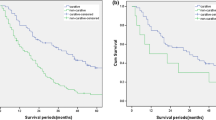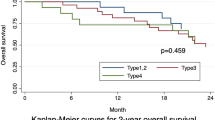Abstract
Background
This study aimed to investigate the clinicopathologic characteristics and outcomes of Borrmann type 1 gastric cancer and evaluate its clinical significance in advanced gastric cancer compared with Borrmann types 2 and 3 cancer.
Methods
Between January 1989 and December 2013, 1949 patients with advanced gastric cancer who underwent curative gastrectomy at our institution were enrolled in the study.
Results
Of the 1949 patients, 59 (3%) exhibited Borrmann type 1 cancer, characterized by a large size, rare serosal invasion, lower lymph node involvement, location in the upper third of the stomach, intestinal type, and differentiated histology. The recurrence rate was higher for Borrmann type 1 than for Borrmann types 2 and 3 cancer. In addition, more than half of the Borrmann type 1 recurrences showed a hematogenous pattern. However, overall survival did not differ significantly among the three cancer types. In the multivariate analysis, Borrmann type 1 cancer, with tumor depth, node metastasis, and vascular invasion, was an independent risk factor associated with recurrence. Particularly, Borrmann type 1 cancer showed a worse prognosis in both overall survival and recurrence-free survival than the other Borrmann types in the upper third of the stomach.
Conclusions
Borrmann type 1 gastric cancer is associated with a higher recurrence rate than Borrmann types 2 and 3, but not with a difference in the overall survival rate.


Similar content being viewed by others
References
Jemal A, Bray F, Center MM, Ferlay J, Ward E, et al. Global cancer statistics. CA Cancer J Clin. 2011;61:69–90.
Marrelli D, Morgagni P, de Manzoni G, Coniglio A, Marchet A, et al. Prognostic value of the 7th AJCC/UICC TNM classification of noncardia gastric cancer: analysis of a large series from specialized Western centers. Ann Surg. 2012;255:486–91.
Hayashi T, Yoshikawa T, Bonam K, Sue-Ling HM, Taguri M, et al. The superiority of the seventh edition of the TNM classification depends on the overall survival of the patient cohort: comparative analysis of the sixth and seventh TNM editions in patients with gastric cancer from Japan and the United Kingdom. Cancer. 2013;119:1330–7.
Huang JY, Xu YY, Li M, Sun Z, Zhu Z, et al. The prognostic impact of occult lymph node metastasis in node-negative gastric cancer: a systematic review and meta-analysis. Ann Surg Oncol. 2013;20:3927–34.
Li C, Oh SJ, Kim S, Hyung WJ, Yan M, et al. Macroscopic Borrmann type as a simple prognostic indicator in patients with advanced gastric cancer. Oncology. 2009;77:197–204.
Yamashita K, Sakuramoto S, Katada N, Kikuchi S, Watanabe M. Simple prognostic indicators using macroscopic features and age in advanced gastric cancer. Hepatogastroenterology. 2014;61:512–7.
Yamashita K, Hosoda K, Katada N, Moriya H, Mieno H, et al. Survival outcome of Borrmann type IV gastric cancer potentially improved by multimodality treatment. Anticancer Res. 2015;35:897–906.
Yamashita K, Ema A, Hosoda K, Mieno H, Moriya H, et al. Macroscopic appearance of type IV and giant type III is a high risk for a poor prognosis in pathological stage II/III advanced gastric cancer with postoperative adjuvant chemotherapy. World J Gastrointest Oncol. 2017;9:166–75.
Luo Y, Gao P, Song Y, Sun J, Huang X, et al. Clinicopathologic characteristics and prognosis of Borrmann type IV gastric cancer: a meta-analysis. World J Surg Oncol. 2016;14:49.
Kim EY, Yoo HM, Song KY, Park CH. Limited significance of curative surgery in Borrmann type IV gastric cancer. Med Oncol. 2016;33:69.
Huang JY, Wang ZN, Lu CY, Miao ZF, Zhu Z, et al. Borrmann type IV gastric cancer should be classified as pT4b disease. J Surg Res. 2016;203:258–67.
Chen JH, Wu CW, Lo SS, Li AF, Hsieh MC, et al. Lymph node metastasis as a single predictor in patients with Borrmann type I gastric cancer. Hepatogastroenterology. 2007;54:981–4.
Washington K. 7th edition of the AJCC cancer staging manual: stomach. Ann Surg Oncol. 2010;17:3077–9.
Japanese Gastric Cancer A. Japanese gastric cancer treatment guidelines 2010 (ver. 3). Gastric Cancer. 2011;14:113–23.
Siewert JR, Bottcher K, Stein HJ, Roder JD. Relevant prognostic factors in gastric cancer: ten-year results of the German Gastric Cancer Study. Ann Surg. 1998;228:449–61.
Katai H, Ishikawa T, Akazawa K, Isobe Y, et al. Five-year survival analysis of surgically resected gastric cancer cases in Japan: a retrospective analysis of more than 100,000 patients from the nationwide registry of the Japanese Gastric Cancer Association (2001–2007). Gastric Cancer. 2018;21:144–54.
Msika S, Benhamiche AM, Jouve JL, Rat P, Faivre J. Prognostic factors after curative resection for gastric cancer: a population-based study. Eur J Cancer. 2000;36:390–6.
Ema A, Yamashita K, Sakuramoto S, Wang G, Mieno H, et al. Lymph node ratio is a critical prognostic predictor in gastric cancer treated with S-1 chemotherapy. Gastric Cancer. 2014;17:67–75.
Kim KH, Kim YM, Kim MC, Jung GJ. Analysis of prognostic factors and outcomes of gastric cancer in younger patients: a case control study using propensity score methods. World J Gastroenterol. 2014;20:3369–75.
Hosoda K, Yamashita K, Katada N, Moriya H, Mieno H, et al. Preoperative tumor size is a critical prognostic factor for patients with Borrmann type III gastric cancer. Surg Today. 2015;45:68–77.
Guo P, Li Y, Zhu Z, Sun Z, Lu C, et al. Prognostic value of tumor size in gastric cancer: an analysis of 2,379 patients. Tumour Biol. 2013;34:1027–35.
Moriguchi S, Kamakura T, Odaka T, Nose Y, Maehara Y, et al. Clinical features of the differentiated and undifferentiated types of advanced gastric carcinoma: univariate and multivariate analyses. J Surg Oncol. 1991;48:202–6.
Kunisaki C, Akiyama H, Nomura M, Matsuda G, Otsuka Y, et al. Clinicopathological properties of poorly differentiated adenocarcinoma of the stomach: comparison of solid- and non-solid-types. Anticancer Res. 2006;26:639–46.
Kunisaki C, Shimada H, Ono HA, Otsuka Y, Matsuda G, et al. Comparison of results of surgery in the upper third and more distal stomach. J Gastrointest Surg. 2006;10:718–26.
Lee JW, Choi MH,Lee YJ, Song KY, Park CH, et al. Radiofrequency ablation for liver metastases in patients with gastric cancer as an alternative to hepatic resection. BMC Cancer. 2017;17:185.
Petrelli F, Ghidini M, Barni S, Steccanella F, Sgroi G, et al. Prognostic role of primary tumor location in non-metastatic gastric cancer: a systematic review and meta-analysis of 50 studies. Ann Surg Oncol. 2017;24:2655–68.
Choi JK, Park YS, Jung DH, Son SY, Ahn SH, et al. Clinical relevance of the tumor location-modified Lauren classification system of gastric cancer. J Gastric Cancer. 2015;15:183–90.
Cancer Genome Atlas Research N. Comprehensive molecular characterization of gastric adenocarcinoma. Nature. 2014;513:202–9.
Acknowledgments
This research was supported by grants from the National Research Foundation of Korea (Grant Nos. 2012R1A1A1043576 and 2015R1A1A1A05028000).
Disclosure
Authors declare that they have no conflict of interest.
Author information
Authors and Affiliations
Corresponding author
Electronic supplementary material
Below is the link to the electronic supplementary material.
Supplementary Fig. S1
Distribution of Borrmann types depends on the location of tumor (TIFF 2229 kb)
Rights and permissions
About this article
Cite this article
Kim, J.H., Lee, H.H., Seo, H.S. et al. Borrmann Type 1 Cancer is Associated with a High Recurrence Rate in Locally Advanced Gastric Cancer. Ann Surg Oncol 25, 2044–2052 (2018). https://doi.org/10.1245/s10434-018-6509-3
Received:
Published:
Issue Date:
DOI: https://doi.org/10.1245/s10434-018-6509-3




